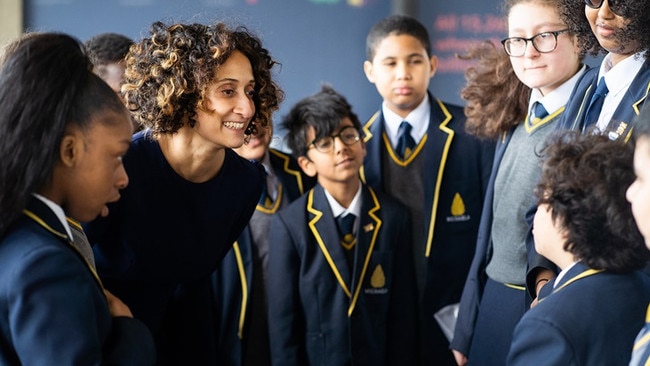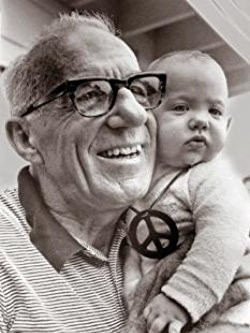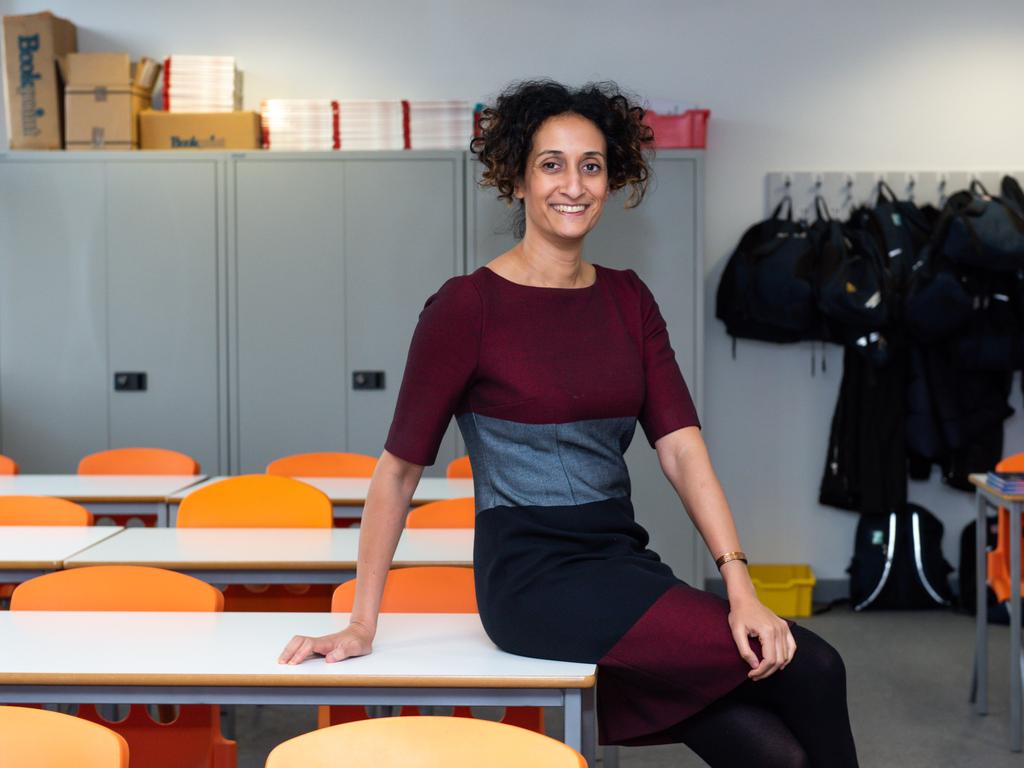Is ‘gentle parenting’ ruining our kids?
The self-styled ‘dragon lady’ behind the unashamedly strictest school in Britain has some stern advice for soft, middle-class parents.

Katharine Birbalsingh once mentioned her belief that children are born with “original sin” on social media and, as she put it later, “the whole world went mad”.
It wasn’t that no one had thought what Birbalsingh said before. The idea of children as sinful little savages in need of firm correction was first articulated by the 17th-century philosopher Thomas Hobbes, later satirised by Charles Dickens, darkly glorified in Lord of the Flies and swearily invoked by a parent (OK, me) who rescued the cat from a toddler stuffing its tail in the toaster. It’s Julia in Motherland saying – with quite a lot of hypocrisy – “You just need to be firm with your kid, Amanda.” But in the past few decades few have been bold enough to say it in public.
Yet Birbalsingh is the rod and lightning rod of British education, the self-styled “dragon lady” and founder of Michaela School, the unashamed strictest school in Britain, as well as the school placed first in the country for children’s academic progress.
Now she has turned her focus on parenting: where, she asks, are the champions, influencers and gurus of strict, demanding child-rearing? Birbalsingh says they need to come forward to counter many decades of well-meaning yet ruinous spoil-the-child advice that “infantilise” parents and are only becoming more popular. She argues that you would have to go back to the 1960s to find books that give parents a sense of “having dominion” over their child.
“The stuff you’ll get nowadays will be much more along the lines of gentle parenting, being friends with your children, not holding them to account,” Birbalsingh said. “And the culture that is created by this literature, written by middle-class people, they don’t realise the absolute destruction that it causes for the working-class family.”
It is interesting that she references the 1960s. It was the turning point, when parents became the problem, not the kids. For most of history children had to be schooled so as not to drive their parents crazy. Now, suddenly, it was the parent who had to go back to school so as not to send their kids crazy.
Case in point: Philippa Perry’s wildly best-selling The Book You Wish Your Parents Had Read, published in 2019, but which draws a direct line from the American author Dr Spock, whose permissive stance was blamed for the wild Sixties youth of the boomer generation. Perry’s book, pressed onto most new parents, summarises the entire genre that I will call “parent, heal thyself”.

Philip Larkin wrote This Be the Verse in 1971, a poem explaining that your parents “f--k you up”, just as they were damaged by their own. Parents were carriers for misery.
Generational misery “deepens like a coastal shelf”. Children didn’t need training, they needed protection. Likewise the vogue for “child-centred” parenting philosophies is that a parent must shield their child from adult insecurities and uncontained anger. We must – preach those such as Sarah Ockwell-Smith in The Gentle Parenting Book – serve as a massive groyne against coastal erosion.
Birbalsingh doesn’t agree. Parents aren’t responsible for decline, quite the reverse; they are the ladder your infant needs to effortfully climb out of their wee-polluted waters. This wasn’t her metaphor, by the way, when I spoke to her at Michaela School in 2017.
She was decades into being an inner-city teacher but just years into being a mother: her child was at the beginning of school. I asked if she had changed her views on child-rearing since becoming a parent. It was a delicious idea, that Birbalsingh might be a giant pushover at home. Of course I was wrong.
“No,” she replied. “Whether you’re a mum or teacher, similar principles apply. You have to have high standards and love them lots, make sure they know you’re on their side. And make sure they understand the reason why you insist on a lot from them is because you love them and want them to succeed in life.”
Fashions in parenting veer like a child on a swing, pushed between two parents with wildly different philosophies. Those who romanticise the 1960s neglect the fact that children were then born to parents ravaged by war, and that a “child-last” school culture could be overtaken by sadists – see the recent memoir by Charles Spencer on his abusive education.
Equally, a parent who breeds simply to supply themselves with a “best friend” seems a sad parody of an organ-donation program. But studies show that children now spend more time with their parents than previous generations and feel closer as a result. Birbalsingh exhorts parents to enforce homework: compared with 20th-century kids, most parents are now expected to get involved with schooling as never before.

Since Spock we now have decades of neuroscience research that shows that “authoritative” parenting leads to the most successful outcomes in children, academically and emotionally. This is the centrist sweet spot between “permissive” (read: “hippie") and “authoritarian”. It’s a warm but boundary-filled home, and a compromise.
But who gets to decide what counts as hitting this magic “Goldilocks” spot? When I toured Michaela the discipline was indeed extreme – demerits for accidentally knocking a sheet of paper to the floor – but the teaching was also ambitious and excellent. One girl said that her mother loved the school because it reminded her of her childhood. Where did her mother go to school, I asked. “Military-run college in Pakistan.”
The offspring of Victorian Britain were “toughened up” by harsh infant regimes to become foot soldiers for the empire. Around the turn of the 21st century there was again a corrective, this time to the progressive philosophies of the 1970s.
Gina Ford became a household name for imposing strict schedules on babies, and Jo Frost, aka Supernanny, became a television star for sorting out unruly children by threatening time-outs while wearing dominatrix-style black leather gloves. In 2011 the Yale law professor Amy Chua wrote Battle Hymn of the Tiger Mother, extolling the strict and education-obsessed Asian parenting regime. “Happiness is not a concept I tend to dwell on,” Chua wrote. “Chinese parenting does not address happiness.”
Birbalsingh was so like-minded she called her book about Michaela The Battle Hymn of the Tiger Teachers, echoing Chua’s mantra that childhood is not an idyll to be enjoyed but a “training period”. Since then the tigers have become a threatened species.
Ford, who believes the parent can impose order on messy babies, is still on the bestseller lists but she receives so much flak for that stance, she is practically a recluse and parents adopt her methods on the quiet. Chua, who was an academic mentor to JD Vance, the new vice-president of the United States, moved on, while Supernanny has hung up her leather gloves.
The new orthodoxy is there in the titles, which emphasise innocence and joy in a way that is pure Jean-Jacques Rousseau, plus a little attachment theory from the 1950s psychiatrist John Bowlby. The big hitters include Calm Parents, Happy Kids by Laura Markham, No Bad Kids by Janet Lansbury and The Happiest Baby on the Block by Harvey Karp, many with endorsements from celebrities.
Karp’s tips include speaking “toddlerese”, ie mirroring their trantrumy demands. Or “playing the boob”, which involves bolstering your child’s confidence by making them feel superior, which you achieve by acting in a silly fashion yourself. Last week the comedian Katherine Ryan revealed that she and her husband Bobby slept in “the children’s room” with their two youngest, aged two and three: very much on trend.
There is no overestimating how much gentle parenting content is pushed to mothers on Instagram. On social media punishment is a dirty word. One of the most famous is Becky Kennedy, aka Dr Becky, a clinical psychologist who has three million followers on Instagram, including half of Hollywood (Blake Lively, Ryan Reynolds, Zoe Saldana, Emmy Rossum, Kate Upton, Eva Mendes and Gigi Hadid). Of course she has a podcast too. Time magazine called her “the millennial parenting whisperer”. Dr Becky advocates no punishments, even when a child has been violent, no sticker charts, bribery or time-outs.
Rather than telling them off, she advises saying “nothing’s feeling the way you want it today” or “something must feel really bad for you to have said that”. When one journalist’s child bonks another child hard on the head, she calls Dr Becky for advice. Dr Becky insists there should be no consequences for bad behaviour.
It would be like “trying to apply logic to a system run by emotion”, Dr Becky says. “What we’re saying is that next time, when a child is overwhelmed with feeling, they will be able to pause and think, ‘Wait a second: if I do this, I’ll be punished.’ But logic just can’t overpower emotion – that is just neuroscience.”
Kate Silverton, the former BBC news reader, is now a child counsellor and author of the best-selling There’s No Such Thing as Naughty. When I interviewed her she countered Birbalsingh’s arguments that progressive parenting was damaging. Quite the reverse, Silverton said: overly strict regimes at home and school were doing the damage.
“I don’t want to pick off particular schools but I know Michaela has been held up as an example of how things should work,” Silverton said. “I’m not really sure, given what we know from the science, that we can honestly say that it’s serving the children and their wellbeing.
“That’s my view, but it’s based on a lot of research. And I know there’s disquiet: while we see fear-based policies effecting ‘good behaviour’ in inverted commas, I think we may look back on this period and wonder, was that actually contributing to a lot of the dysregulation that we’re seeing?”
The tigers, Birbalsingh’s roars aside, have gone very quiet. This isn’t their time. But that doesn’t mean they aren’t out there. The Nigerian author Wole Soyinka wrote “A tiger does not shout its tigritude, it acts.”
Chinese, Indian, Pakistani, black African and Bangladeshi children in the UK all outperformed white British children in GCSEs in 2023, probably because of sheer old-fashioned parental pushiness. Meanwhile, white middle-class parents are covert about their tutoring and violin budgets because they view themselves in a kind of stealthy parental arms race.
Birbalsingh remembers growing up in Canada as the daughter of a “very strict” Indian-Guyanese father. She was, she told The Sacred Podcast in 2023, a “quite naughty child”. When her father discovered her binge-watching television instead of reading, he pulled the wires out of the back of the TV.
She found a way to rewire it and would sneak screen time when he was out. When he came home one day to find her reading sweetly on the sofa, he put his hand on the back of the TV. It was still warm, and so he gave the family television away. Birbalsingh ended up at Oxford University, and a national figure. Her critics would argue he did a bad job.
The Times




To join the conversation, please log in. Don't have an account? Register
Join the conversation, you are commenting as Logout